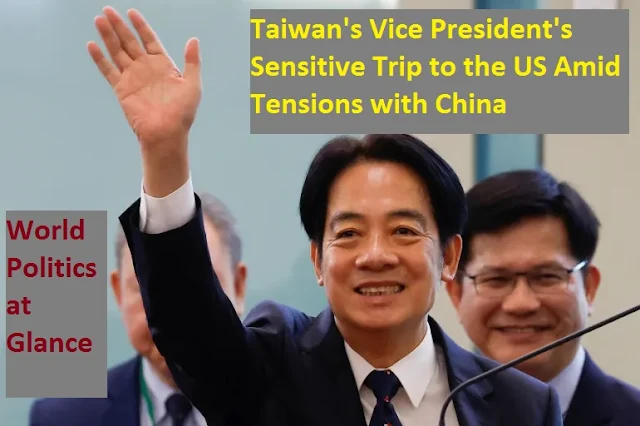 |
| Image Source: Google/ Al-Jazeera |
Taiwan's Vice President's Sensitive Trip to the US Amid Tensions with China
Vice President of Taiwan William Lai is embarked on a significant journey to the United States.
The visit has caused China's disapproval and raised concerns among Taiwanese officials about potential escalated Chinese military actions around the island.
Lai, a leading contender in Taiwan's upcoming January presidential elections, is officially making transit stops in the US en route to and from Paraguay, where he will attend the swearing-in of its president.
Key Points:
Lai's Delicate Trip Amid Escalating Tensions:
Lai's visit to the US comes at a sensitive time, as China's criticism and fears of increased military activities loom.
The tensions underscore the complex relationships between Taiwan, the US, and China.
Transit Stops Amid Presidential Ambitions:
As a frontrunner in Taiwan's upcoming presidential elections, Lai's transit stops are being watched closely.
His official visit to Paraguay holds significance as it provides an opportunity to deepen ties and establish connections with like-minded partners.
Showcasing Democracy and Values:
Lai's Paraguay visit aims to emphasize Taiwan's commitment to democracy, freedom, and human rights while participating actively in international affairs.
This move is intended to gain global recognition of Taiwan's values and principles.
Routine Stopovers or Provocative Actions?
Taipei and Washington downplay the transit stops as routine, asserting that they shouldn't provoke China.
However, Beijing sees these stops as indications of US support for Taiwan's sovereign status, leading to increased tensions.
China's Military Posturing:
China's intention to conduct military drills near Taiwan in the coming week is noteworthy.
In the lead-up to Lai's departure, increased incursions by the Chinese military in Taiwan's airspace have been observed.
Recent activities reflect China's assertiveness and ongoing military buildup.
Taiwan's Defense Measures:
Taiwan's Ministry of National Defense reported a significant number of Chinese warplanes and vessels detected near the island.
Such incidents, combined with China's military exercises, contribute to the tense atmosphere.
China's Disapproval of Lai:
China's strong opposition to Lai's trip is rooted in his history of advocating for Taiwan's independence.
Despite Lai's reassurances during the election campaign that he aims to maintain the status quo, Beijing remains wary of his intentions.
Keeping the US Stops Low-Key:
Both Taiwan and the United States are cautious about revealing exact details of Lai's US schedule.
The low-key approach is intended to avoid exacerbating tensions further.
Strategic Paraguay Visit:
Lai's visit to Paraguay is of strategic importance, given China's persistent efforts to erode Taiwan's diplomatic ties.
China's attempts to influence Taiwan's remaining allies have prompted Taiwan to strengthen relationships with nations that share its values.
China's Response and Calls for Caution:
China's foreign ministry spokesman, Jeff Liu, downplays the US transit, urging restraint and calling Lai's visit routine.
He emphasizes that any escalation would originate from China, not Taiwan or the United States.
China's Oath to Protect Sovereignty:
China's commitment to protecting its sovereignty is reaffirmed following Lai's US visit.
China's stance underscores its claim to Taiwan as a core interest, fueled by its belief that Taiwan seeks support from the US to pursue independence.
Lai's Independence Advocacy and China's Concerns:
Lai's outspoken support for Taiwan's independence puts him at odds with Beijing's stance.
While President Tsai Ing-wen's approach is already viewed unfavorably by China, Lai's strong pro-independence stance raises further concerns.
Lai's Arrival in New York:
Lai's arrival in New York is met with optimism as he praises the city as an icon of liberty and democracy.
His reception by the American Institute in Taiwan marks a significant moment in his visit.
Engagement with Overseas Taiwanese:
Lai's engagement with overseas Taiwanese during his stopover in New York underscores his commitment to his cause.
He is expected to make a speech during receptions, focusing on Taiwan's values and aspirations.
Managing Risks Amid Growing Tensions:
Lai's visit is characterized by a shared aim to manage risks in the face of an authoritarian region.
Both Taipei and Washington strive for caution and stability during this critical period.
China's Intimidation Tactics:
Taiwanese officials express concerns that China might use Lai's US stopovers as a pretext for military drills to intimidate voters ahead of the next year's election, creating a climate of fear.
China's Military Posturing Continues:
China's Eastern Theatre Command of the People's Liberation Army showcases its military drills through videos of fighter jets engaged in high-intensity flight training.
These actions contribute to the overall tensions.
US-China Diplomatic Efforts and Geopolitical Landscape:
Lai's transit coincides with ongoing diplomatic efforts between the US and China.
A potential meeting between US President Joe Biden and China's leader Xi Jinping is anticipated, indicating a broader geopolitical landscape.
China's Pursuit of Sovereignty:
China's intensified military activities around Taiwan in recent years reflect its goal to assert sovereignty.
The backdrop of China's military exercises underscores its efforts to influence Taiwan's diplomatic decisions.
China's Response to US-Taiwan Relations:
China's military exercises are often triggered by perceived US support for Taiwan.
This pattern emerged following Taiwan President Tsai's US visit after meeting US House Speaker Kevin McCarthy.
Conclusion:
Lai's sensitive trip to the US as Taiwan's Vice President carries substantial geopolitical implications.
It underscores the complex dynamics among Taiwan, China, and the United States.
As the international community watches these developments, the situation continues to evolve in East Asia.
(Source: Al-Jazeera)
Post a Comment
0Comments